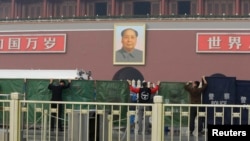Chinese state media on Thursday blamed Muslim minority Uighurs for a "terrorist attack" in which a car was driven through a crowd of people at Tiananmen Square.
Beijing says the deadly Monday crash was a suicide mission planned by religious extremists from the troubled northwest region of Xinjiang, where Uighurs have long complained of government persecution.
Police say they believe Usmen Hasan crashed a vehicle carrying his mother and wife into a crowd of people in the square, before lighting the car on fire. All three died at the scene, as did two tourists. Dozens were wounded.
Officials say they found gasoline, knives, steel sticks and a flag with extremist religious content inside the burnt-out vehicle. They also arrested five people from Xinjiang, who were said to be planning attacks with Hasan.
While police did not specify the ethnicity of the attackers, the Communist Party-controlled Global Times said Thursday all those involved were Uighurs. The paper called for a "unified front against terrorism," and warned Uighurs will be the "biggest victims" of the attack.
Some fear the incident could be used to justify further restrictions on the Uighur community, and question key aspects of the government's investigation.
Dolkun Isa, the executive chairman of the World Uyghur Congress, tells VOA he finds it inconceivable a family would work together on such a barbaric attack.
"If this is really a suicide and terrorist activity, how is it possible that someone could do this together with their mother and wife? It's impossible," he said.
The Germany-based activist also wants to know how investigators were able to find such specific evidence of religious propaganda in a car that pictures showed was fully engulfed in flames.
"If the all the car is burning, how could they recognize in the car some material that belongs to religious extremists?" he asks.
The World Uyghur Congress does not deny Uighur individuals sometimes engage in violence, out of what it calls desperation. But, contrary to Beijing's claims, it says there is no organized resistance against Chinese rule.
The group also says Beijing intentionally exaggerates this threat in order to further its repression of Uighurs. Dolkun Isa says this has already begun to happen in the wake of the Monday incident, with an increased security presence reported there.
China has defended its policies in Xinjiang, saying it is waging a campaign against separatists who are trying to form a separate nation called East Turkestan. It denies mistreating Uighurs, who it says are are guaranteed wide-ranging religious and cultural freedoms and are benefiting from urban development.
Clashes in Xinjiang are not uncommon between Uighurs and the Han Chinese majority or members of the government security forces. Beijing says over 200 people have been killed in such attacks in recent years. But this is the first time Chinese authorities have blamed Uighurs for a major incident in Beijing.
Beijing says the deadly Monday crash was a suicide mission planned by religious extremists from the troubled northwest region of Xinjiang, where Uighurs have long complained of government persecution.
Police say they believe Usmen Hasan crashed a vehicle carrying his mother and wife into a crowd of people in the square, before lighting the car on fire. All three died at the scene, as did two tourists. Dozens were wounded.
Officials say they found gasoline, knives, steel sticks and a flag with extremist religious content inside the burnt-out vehicle. They also arrested five people from Xinjiang, who were said to be planning attacks with Hasan.
While police did not specify the ethnicity of the attackers, the Communist Party-controlled Global Times said Thursday all those involved were Uighurs. The paper called for a "unified front against terrorism," and warned Uighurs will be the "biggest victims" of the attack.
Some fear the incident could be used to justify further restrictions on the Uighur community, and question key aspects of the government's investigation.
Dolkun Isa, the executive chairman of the World Uyghur Congress, tells VOA he finds it inconceivable a family would work together on such a barbaric attack.
"If this is really a suicide and terrorist activity, how is it possible that someone could do this together with their mother and wife? It's impossible," he said.
The Germany-based activist also wants to know how investigators were able to find such specific evidence of religious propaganda in a car that pictures showed was fully engulfed in flames.
"If the all the car is burning, how could they recognize in the car some material that belongs to religious extremists?" he asks.
The World Uyghur Congress does not deny Uighur individuals sometimes engage in violence, out of what it calls desperation. But, contrary to Beijing's claims, it says there is no organized resistance against Chinese rule.
The group also says Beijing intentionally exaggerates this threat in order to further its repression of Uighurs. Dolkun Isa says this has already begun to happen in the wake of the Monday incident, with an increased security presence reported there.
China has defended its policies in Xinjiang, saying it is waging a campaign against separatists who are trying to form a separate nation called East Turkestan. It denies mistreating Uighurs, who it says are are guaranteed wide-ranging religious and cultural freedoms and are benefiting from urban development.
Clashes in Xinjiang are not uncommon between Uighurs and the Han Chinese majority or members of the government security forces. Beijing says over 200 people have been killed in such attacks in recent years. But this is the first time Chinese authorities have blamed Uighurs for a major incident in Beijing.




